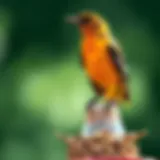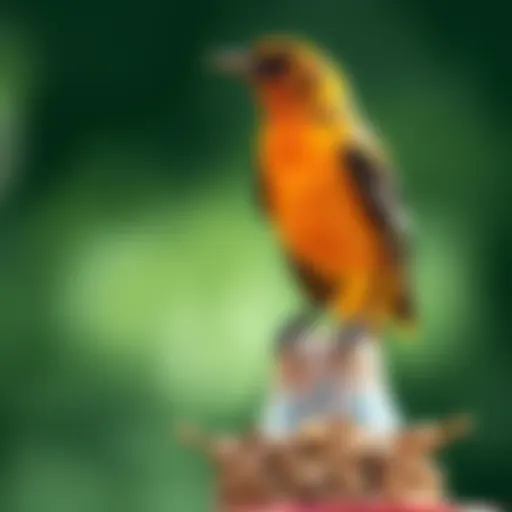Understanding Pet Bird Nutrition and Survival
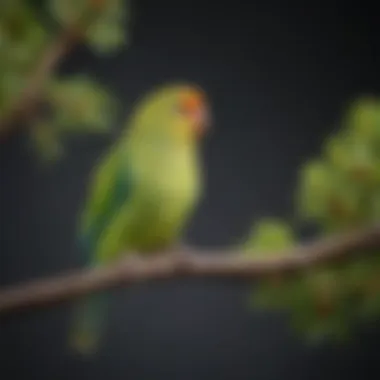
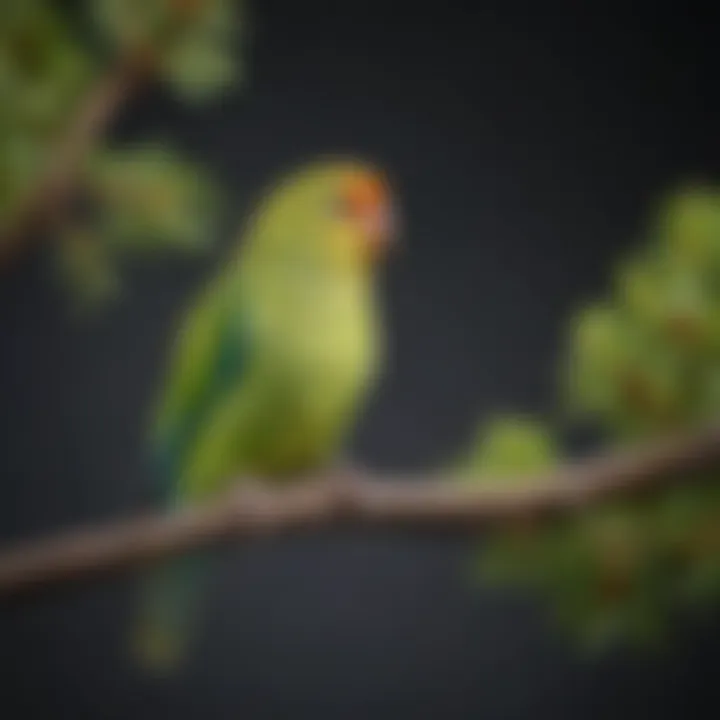
Intro
When owning a pet bird, many aspects come into play, but if there's one thing that stands out, it's nutrition. Far more than just seed in a dish, the right diet can dictate a bird's vitality and longevity. This article sheds light on a pressing issue: how long can pet birds go without food, and why understanding nutritional needs is paramount for the welfare of our avian companions. While we often get caught in the charm of chirpy voices and vibrant feathers, it's their biology that speaks volumes about what sustains them.
Birds have a unique metabolism, prompting pet owners to stay informed about the dietary needs of their feathered friends. Without proper nutrition, the health of birds can spiral downwards faster than one might expect. Take a moment to consider not just how they eat, but what they consume. This helps shape their physical health while also impacting their emotional well-being.
In this guide, we'll explore various facets of bird care, nutrition essentials that contribute to their survival, and delve into the varied world of dietary needs within different bird species. Knowing these facts is the cornerstone of providing a fulfilling and healthy life for pet birds.
The Importance of Nutrition for Pet Birds
The significance of proper nutrition in pet birds cannot be overstated. Just like humans, these feathered companions require a balanced diet to thrive and maintain health. While pet birds might seem resilient, neglecting their nutritional needs can lead to severe health issues, ultimately affecting their lifespan. When you consider that their instincts drive them to seek food, it’s clear that understanding what they need to consume, is just as crucial sometimes as providing that food.
Fundamental Nutritional Requirements
Within the vast array of avian diet plans, there are key dietary components that pet birds need to ensure they remain healthy. These essential nutrients include vitamins and minerals, proteins and fats, as well as carbohydrates and fiber, each playing a unique role in their overall health.
Vitamins and Minerals
Vitamins and minerals serve as the building blocks for a bird's immune system and cellular function. For instance, Vitamin A is vital for eyesight, while calcium is crucial for strong bones and eggshell production. The interplay of these vitamins often gives them a critical role in promoting overall vitality. When birds don't get enough of these nutrients, they can develop deficiencies that manifest in various health problems, such as beak and feather disorders or weakened bones.
- Key Characteristic: These nutrients support growth, reproduction, and physiological functions.
- Unique Feature: Certain minerals, like zinc and iron, require careful balance, as too much can be harmful.
Proteins and Fats
Proteins and fats are essential for muscle growth and energy production. Birds that are active require adequate protein to repair tissues and maintain their energy levels. Fats, on the other hand, provide concentrated energy that can sustain them during periods of high activity or stress. The types of proteins matter too; for example, some birds benefit more from animal-based proteins, whereas others do well with plant-based options.
- Key Characteristic: They play a huge role in growth and maintaining energy levels.
- Unique Feature: Balance is critical; too much protein can lead to kidney issues in some species while insufficient fat consumption can cause energy depletion.
Carbohydrates and Fiber
Carbohydrates are often seen as the energy currency for birds. Fiber, while also a carbohydrate, provides bulk and helps maintain a healthy digestive tract. A diet rich in fiber can prevent issues such as obesity or gastrointestinal stasis, promoting a healthy gut. Many users overlook this aspect, thinking only of fats and proteins. Incorporating fiber-rich foods, like specific seeds and fruits, helps birds regulate their metabolism better.
- Key Characteristic: They foster a healthy digestive system and energy maintenance.
- Unique Feature: The solitude offered by fiber can often be underappreciated in bird diets, leading to suboptimal health outcomes.
Species-Specific Nutritional Needs
It’s not merely about the food composition but also how that composition relates to each species. Different birds have specific nutritional requirements, shaped by their natural habitats and behaviors. This is crucial when considering how to maintain optimal health standards for pet birds.
Parrots
When thinking about parrots, one may immediately associate them with vibrant feathers and noisy personalities. But what many forget is that their diet should showcase variety. Parrots thrive on a mix of seeds, fresh fruits, vegetables, and even nuts. This diverse diet not only provides essential vitamins and minerals but also promotes mental stimulation through varied textures and flavors.
- Key Characteristic: Their diet must reflect their omnivorous nature.
- Unique Feature: Their curiosity often leads them to explore food, making diverse diets essential for mental well-being.
Canaries
Canaries, often stylish with their bright colors and melodious tunes, prefer seeds as their primary food source. While they enjoy seeds, adding leafy greens and occasional fruits helps alleviate deficiencies in their diet. A canary’s well-being significantly hinges on sufficient vitamin intake for soft tissue health and plumage quality, particularly for breeding pairs.
- Key Characteristic: Inclination towards seeds with limited usage of fruits and vegetables makes them unique.
- Unique Feature: Selecting high-quality seeds rich in nutrients is often a challenge for new bird owners to navigate.
Finches
Finches are known for their small size and lively demeanor. Their diets can be slightly different, emphasizing a mix of seeds that cater to their specific digestive needs and energy levels. Finches benefit from both dry seed mixes and fresh greens, alongside the necessity of grit for digestion. Some species, such as zebra finches, have unique dietary preferences that must be catered to for optimal health.
- Key Characteristic: Small, frequent meals lead to healthy digestion and energy balance.
- Unique Feature: Their behavioral tendency to forage requires a diverse offering of foods to engage their natural instincts.
In sum, understanding the nutritional nuances of these pets is vital for satisfactory growth and development. Ensuring a balanced mix of the right food types meets both their health and emotional needs, keeping them chirpy and well.
Survival Without Food: A Biological Perspective
Understanding how pet birds survive without food is pivotal. This section highlights the intricate balance of biological mechanisms that are crucial for their survival. The unique physiology of birds means that their bodies rely on a variety of processes to utilize stored energy and maintain vital functions.
Avian Metabolism and Energy Utilization
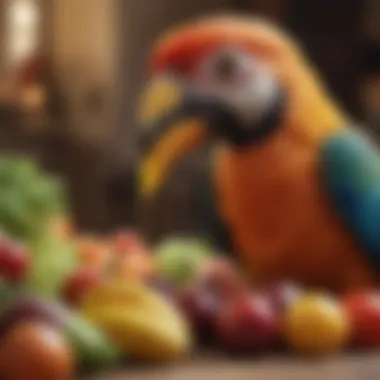
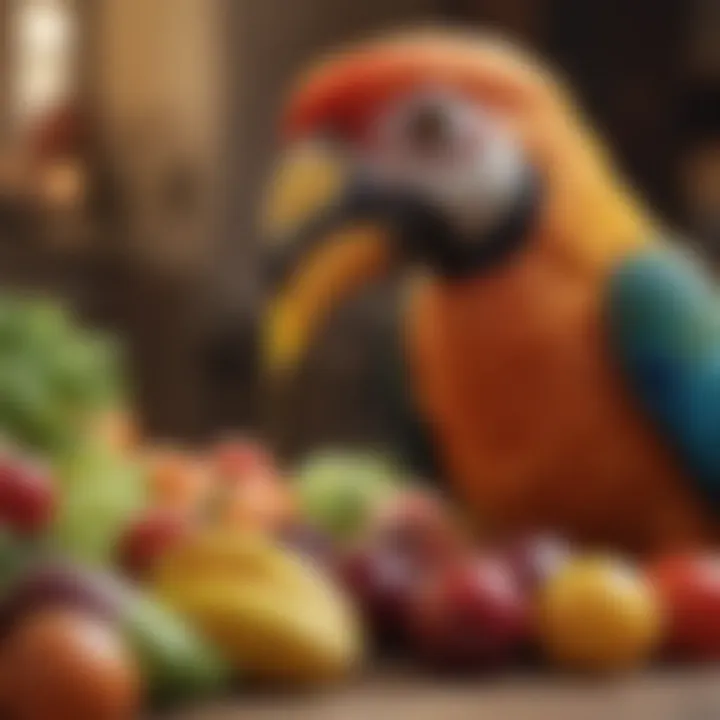
Metabolic Rates
Metabolic rates in birds are quite the fascinating subject. Birds generally have a higher metabolic rate than many mammals, meaning they need energy more frequently. This characteristic is closely tied to their active lifestyles and, particularly for species like hummingbirds, their need to sustain flight. The rapid conversion of stored energy into usable energy allows birds to function effectively in the wild.
Unique to birds is their complicated energy utilization, often segmented between immediate usage and long-term storage. A healthier diet fosters an efficient metabolism, which can be critical in times of food scarcity. In terms of advantages, this high metabolic rate aids in quick recovery from food deprivation. On the flip side, it also means that they can succumb to starvation faster than other animals with slower metabolism.
Energy Reserves
Energy reserves are another essential aspect to consider. Birds store energy primarily as fat, which can be quickly mobilized during periods without food. This is crucial in understanding their survival strategies; reserves are not just backup storage but an active part of their biological response to food scarcity.
The ability to rely on fat stores enables birds to endure longer periods without food than one might initially expect. However, if these reserves are exhausted, the consequences can be dire. While they offer the advantage of prolonged survival, especially during migration or harsh conditions, they also present the risk of depleting vital energy too rapidly in stressful situations.
Dehydration and Its Implications
Signs of Dehydration
Dehydration is an often-overlooked factor when discussing survival. As we know, water is vital for all life forms, and pet birds are no exception. Recognizing the signs of dehydration is crucial for any pet bird owner. Common indicators include lethargy, sunken eyes, and dry mucous membranes. Each of these symptoms points to a larger issue that could escalate if not addressed timely. It's essential for bird owners to understand that subtle changes in behavior or appearance can be early signs that their avian friend is in distress.
By identifying these signals, owners can take proactive steps to provide hydration before severe dehydration sets in, ensuring the well-being of their beloved pets.
Consequences of Fluid Loss
The consequences of fluid loss in birds can be quite severe. Without adequate water intake, birds can quickly develop complications. Electrolyte imbalance, for instance, can have catastrophic effects on their organs. As they aren't great at regenerating electrolytes, the depletion can lead to muscle weakness or even organ failure.
Fluid loss not only affects physiological health but can severely alter behavior. Birds may become more irritable or withdraw from their usual activities. This nuanced understanding emphasizes the importance of monitoring both food and water intake.
Understanding the complex relationship between food, water, and avian health is essential for ensuring that pet birds thrive in a domestic setting.
How Long Can Pet Birds Go Without Food?
Understanding how long pet birds can survive without food is crucial for any bird owner. These feathered companions rely on a steady supply of nutrients, and knowing the limits can be lifesaving. Without food, a bird may exhibit a variety of symptoms that can escalate quickly into serious health issues. Having this knowledge empowers owners to take timely action if a bird refuses to eat. It also teaches the importance of maintaining routine feeding schedules and proper nutrition to prevent emergencies before they happen.
Factors Affecting Survival Time
When considering how long a bird can last without food, several factors come into play.
Bird Species Variation
Birds are as diverse as their habitats. Different species have unique metabolic rates and energy needs, which significantly influence how long they can go without food. For instance, a small finch might only manage a day or two without sustenance, while a larger parrot may hold out for a week.
The key characteristic here is metabolism. Some birds can burn through their energy reserves more quickly due to high activity levels or environmental stress. This makes understanding the differences in species not just interesting but essential for pet care.
Advantages of knowing these variations include:
- Better preparedness for any food shortages.
- Tailored feeding regimes based on species needs.
- Awareness of specific risks and signs for different birds.
Age and Health Status
Another critical factor is the age and health of the bird. A young, healthy bird with adequate body weight can usually withstand fasting longer than an older or ailing bird can. Health complications like obesity, organ issues, or chronic conditions may shorten survival time significantly.
Unique feature: health status can drastically change a bird's resilience.
Possible advantages include:
- Understanding your bird’s unique dietary needs can promote a healthier lifestyle.
- Encouragement to provide regular check-ups to ensure ongoing fitness and well-being.
Environmental Conditions
The environment plays a pivotal role. A warm, stress-inducing environment can lead to increased metabolic rates, compelling the bird to utilize its energy reserves more quickly. Conversely, a cooler environment may slow metabolic rates, extending the duration of food deprivation.
In this context, the key characteristic is stability versus stress. Birds in a calm, controlled atmosphere might cope better than those in high-stress conditions, such as loud homes or during frequent human traffic.
Advantages in managing environmental conditions involve:


- Providing a stable habitat can be a form of prevention against food scarcity.
- Awareness of any calm and stress could guide care practices.
General Survival Guidelines
As pet bird owners, knowing general survival guidelines regarding food deprivation is vital. This helps in preparing for potential emergencies and ensuring their safety.
Timeframes for Different Species
Different bird species exhibit varied survival timelines without food, highlighting the importance of species awareness. For example, an average cockatiel can go approximately 48 hours without food, while an Amazon parrot might stretch this to five days under severe conditions.
Unique features of these timeframes include:
- The variability can help owners manage expectations and responses in emergencies.
- Species classifications offer a guideline for creating tailored care routines.
Emergency Scenarios
Preparedness in emergencies is crucial. If a bird goes without food due to unforeseen circumstances, different strategies can aid in recovery. Knowledge about how to approach such situations—like recognizing signs of distress or appropriate interventions—can greatly impact their chances of survival.
The key characteristic here is quick response and adaptability. Understanding signs of starvation can guide immediate action, whether it’s through offering safe food alternatives or contacting a veterinarian.
Unique features of emergency knowledge include:
- Quick recognition of potential health issues can lead to early interventions and recoveries.
- Preparing emergency supplies and lists can ease panic and ensure birds get needed care swiftly.
Consequences of Prolonged Food Deprivation
Understanding what happens when pet birds experience food deprivation is essential for anyone who cares for these creatures. It's not just about the lack of food; it's about how it impacts their overall health and behavior. Awareness of these consequences can empower bird owners to take preventive measures and care initiatives that can save a life.
Physical Health Impacts
Weight Loss and Muscle Atrophy
When a pet bird does not get adequate nutrition, weight loss can occur rapidly. This is because birds have a high metabolic rate, and their bodies require a constant supply of energy to function properly. Inadequate food intake leads to the utilization of fat reserves, followed by muscle tissue as the body looks for alternate energy sources. As muscle mass decreases, so does the bird’s strength, making it harder for them to fly, perch, or engage in normal activities.
One key characteristic of muscle atrophy is that it can be quite insidious. Initially, you might notice that the bird is less active or playful. As the condition progresses, it can lead to significant weakness, rendering them unable to perform basic functions. When a bird loses more than a certain percentage of its body weight—usually around 10 percent—it can quickly lead to serious health consequences.
Thus, while weight loss is often seen as a sign of starvation or deprivation, it also serves as a warning bell for owners to act frequently in the interest of their pet's health. This topic's significance lies in helping owners understand that neglecting a balanced diet does not only affect body weight but also can lead to irreversible damage, especially if corrective actions aren't taken timely.
Organ Failure
Another grave consequence of prolonged food deprivation is the potential for organ failure. Without sufficient nutrition, vital organs like the liver and kidneys begin to deteriorate. A bird’s body struggles to maintain its functions, resulting in increased toxins and metabolic waste. This condition, if left untreated, can escalate into complete organ shutdown.
Organ failure is particularly concerning because symptoms can be quite subtle at first. You might observe lethargy or lack of appetite, but these signs can easily be attributed to more immediate issues. The key here is to stay alert. The unique feature of organ failure in birds is that it may not always be evident until it’s too late.
Thus, the implications of declining organ health cannot be overstated. Regular vet check-ups become essential for early detection of these issues. The urgency surrounding this topic is less about alarmism and more about creating a conscientious approach to avian care.
Behavioral Changes in Starvation
Aggression and Anxiety
Starvation undoubtedly affects a bird’s behavior, leading to an uptick in aggression and anxiety. When food scarcity triggers stress, the bird can exhibit unpredictable behavior. This might manifest as increased biting, frantic vocalizations, or a general state of agitated restlessness. It’s as if the bird feels it’s in a state of survival, and this fear can provoke aggressive reactions to perceived threats.
The reason this aspect is crucial for understanding pet bird nutrition is that it underscores the profound link between a bird's emotional state and its dietary needs. Owners might mistake aggressive behaviors simply as poor temperament, missing the underlying cause of stress due to food deprivation. Thus, addressing nutritional needs becomes not just a matter of physical health but emotional wellbeing, which also furthers the importance of regular feeding routines.
Abnormal Feeding Behaviors
Another behavioral indicator of prolonged food deprivation emerges as abnormal feeding behaviors. In desperate circumstances, a bird may begin exhibiting compulsive feeding practices or even hoarding behaviors. For instance, a bird may overeat when food is available, trying to compensate for past deprivations, or it could become finicky, exhibiting aversion to certain foods that it once eagerly consumed.
This characteristic draws attention to the idea that behavior-driven changes can signal deficiencies. It hints at the complex psychological dynamics that should concern pet bird owners. Seeing changes in feeding habits should compel owners to scrutinize their pets’ diets and consult veterinarians when necessary.
Feeding Practices for Longevity
Feeding practices hold a pivotal role in ensuring the longevity and overall health of pet birds. A well-rounded diet not only meets the nutritional demands of diverse bird species, but contributes greatly to their vitality. This section delves into the essential elements for sustaining your avian companions through optimum feeding strategies, ensuring they thrive rather than merely survive.
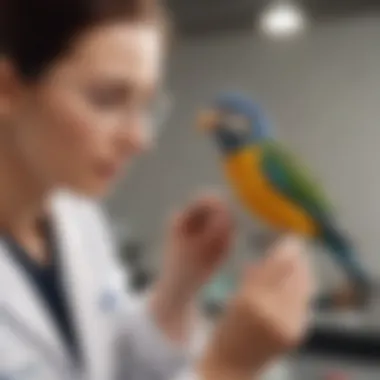
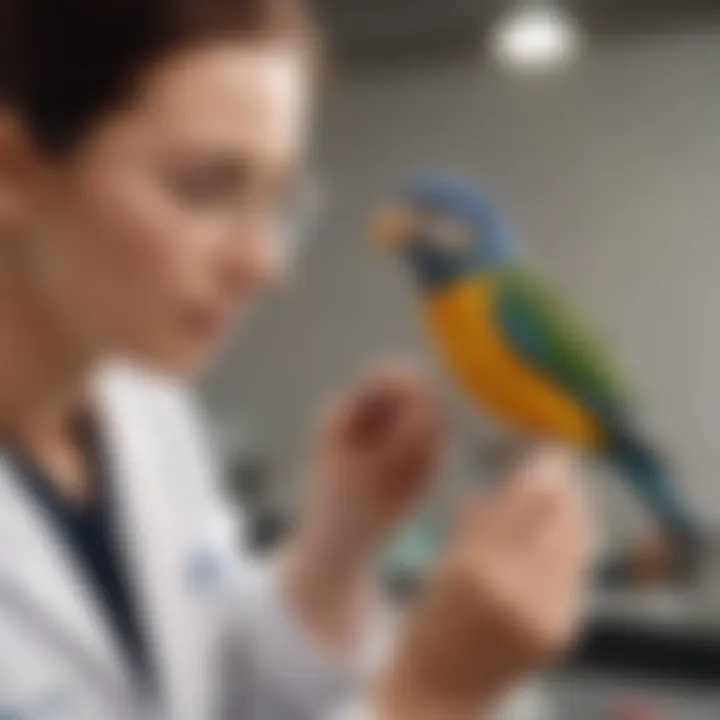
Developing a Balanced Diet Plan
Fresh Fruits and Vegetables
Fresh fruits and vegetables are brimming with vital vitamins and minerals that can significantly boost a bird's health. The colorful spectrum of produce offers a wide array of phytonutrients, making it a popular choice among bird owners. These foods provide hydration which is crucial, particularly in dry environments.
Incorporating various options like spinach, carrots, apples, and broccoli into your bird's diet not only fosters immune health but stimulates appetite. The crunchiness of raw veggies can also be mentally stimulating for birds, alleviating boredom and promoting natural foraging behaviors. However, it’s essential to remember that some fruits (like avocados) and certain vegetables can be toxic to birds. Careful research, therefore, is essential.
"A colorful plate often leads to a colorful life for our feathered friends."
Seeds and Pellets
Seeds and pellets form the backbone of many pet birds' diets, providing key nutrients and energy. Quality seed mixes generally have a variety of ingredients, aimed at mimicking a bird's natural diet. Pellets, on the other hand, have gained popularity as they’re formulated to contain the necessary vitamins and minerals in every bite.
This blend of nutrition can help prevent deficiency-related illnesses; nevertheless, moderation is key. Many birds have a tendency to favor seeds over pellets, leading to an imbalance in their dietary intake. It's crucial to ensure that your bird has access to fresh pellets alongside seeds to maintain broad nutritional coverage. The unique feature of this combination is how it supports a balanced diet while catering to the bird's innate preferences.
Establishing a Feeding Schedule
Establishing a consistent feeding schedule is integral to promoting your bird's well-being. Birds naturally thrive on routine, and a regulated feeding time helps mimic the natural rhythm of their wild counterparts.
Frequency of Feedings
Frequency of feedings can vary depending on the species, age, and activity levels of the bird. Many pet birds thrive on two main feedings a day, supplemented by snacks or fresh produce in between. Regular feeding intervals contribute to more stable energy levels and help in managing hunger cues effectively. Keeping consistent time frames can also aid owners in identifying any behavioral changes or health issues that might emerge should a bird show signs of lethargy or stress.
Unquestionably, a structured routine is beneficial for both pet and owner, ensuring birds rely less on foraging which can lead to excess weight gain if improperly monitored.
Monitoring Food Intake
Monitoring food intake isn’t just about ensuring birds get enough to eat; it’s also about tracking their health and nutritional status. By keeping an eye on how much food your bird consumes, you can discern any sudden changes that might indicate health problems.
Daily enclosure checks for uneaten or spilled food can be revealing, as certain birds may pick selectively. Noticing patterns in their consumption can highlight preferences, or signal when a dietary adjustment is necessary.
This attentiveness fosters a stronger bond between the bird and handler, and can significantly impact the longevity of your feathered friend.
Assessing Nutritional Deficiencies
Understanding nutritional deficiencies in pet birds is not just a casual endeavor; it’s a cornerstone of ensuring their overall health and longevity. This section delves into identifying issues related to their diets and provides insights into effective intervention strategies. The focus here lies on recognizing symptoms that can signal a deficiency, as well as consulting professionals who specialize in avian health.
Identifying Symptoms of Poor Nutrition
Physical Signs
Physical signs of nutritional deficiencies in birds stand out as crucial indicators of their health status. For instance, a bird's plumage may appear dull or ragged when it is lacking essential nutrients like proteins or fatty acids. This characteristic is particularly telling as it often suggests that the bird's diet is unbalanced or inadequate. An otherwise vibrant bird might also exhibit lethargy, which can be tied back to the lack of vitamins or minerals that support energy production.
One unique feature of physical signs is that they often develop over time. This slow progression means that owners might overlook subtle changes until they are pronounced, highlighting the importance of regular health checks. A direct advantage of observing these signs is that they allow for early detection of potential health issues, enabling owners to make timely changes to their bird's diet or seek veterinary guidance before matters escalate.
Behavioral Indicators
Behavioral indicators of poor nutrition are equally essential to recognize. A bird that used to sing and chatter might suddenly become quiet or aggressive, indicating that something is amiss. Changes in feeding behaviors, such as an abrupt refusal of food or an obsession with one type of seed, can also signal deficiencies in their dietary intake.
This noticeable shift in behavior highlights the fact that birds are sensitive to changes in their nutritional intake. Owners observing such patterns should take heed as they can be the first line of defense in capturing underlying health concerns. However, it's worth noting that behavioral indicators can sometimes overlap with other issues, like environmental stressors. Therefore, caution is necessary when assessing these signs, as they are just part of a larger puzzle.
Consulting Avian Veterinarians
Nutritional Testing
When in doubt, consulting an avian veterinarian can provide invaluable insights into a bird’s health. Nutritional testing is a method used to evaluate the specific nutrients present in a bird's system. This testing can reveal imbalances or deficiencies directly, allowing for a more targeted approach to diet modification. Veterinarians will collect samples and analyze them, ensuring accurate results for the owner's peace of mind.
A major advantage of nutritional testing is its ability to provide specific, actionable data rather than relying solely on observation. This method takes the guesswork out of improving a bird's health and can save time and resources in the long run, leading to more efficient dietary interventions.
Supplement Recommendations
Sometimes dietary changes alone aren’t enough to bring a bird back to optimal health. This is where supplement recommendations come into play. Avian veterinarians can prescribe specific vitamins or minerals that may be missing from a bird’s diet. For instance, if tests reveal deficiencies in calcium levels, the vet may suggest calcium supplements to counteract the lack.
The great feature of supplement recommendations is their ability to complement a bird's existing diet effectively. This tailored approach maximizes the chance of improvement in a shorter timeframe. However, it's imperative to use these supplements under professional guidance, as over-supplementation can lead to other health issues.
"A balanced diet isn’t merely about feeding your bird; it’s about understanding their unique needs and addressing them promptly."
In summary, assessing nutritional deficiencies requires careful observation and professional input. Identifying physical signs and behavioral indicators sets the stage for timely interventions. Moreover, consulting an avian veterinarian for nutritional testing and supplement recommendations ensures a more thorough and effective strategy in safeguarding your pet bird’s health.












